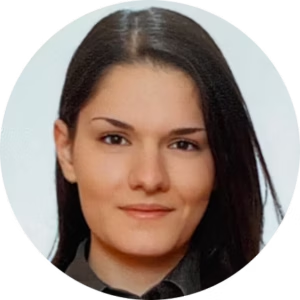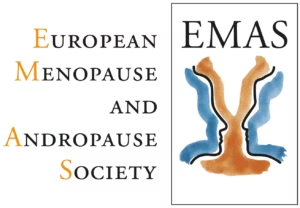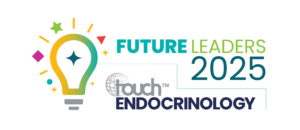 Dr Kristina Saravinovska is a junior research assistant and PhD candidate at the Faculty of Medicine, University of Belgrade, and an internal medicine resident at the University Clinical Centre of Serbia. Her research spans reproductive, adrenal, environmental endocrinology and obesity, with a focus on the impact of COVID-19 on women’s reproductive and mental health. Recently nominated for this feature in collaboration with the European Menopause and Andropause Society (EMAS), she is Co-chair of the European Society of Endocrinology’s (ESE) Young Endocrinologists and Scientists Committee (EYES), where she leads the EYES Observership Programmes and contributes to strategic initiatives through the ESE Clinical Committee, State of Endocrinology Task Force, and EndoCompass project. Kristina also collaborates with the EMAS, having organized joint EMAS–EYES webinars and presented award-winning work at the EMAS Congress.
Dr Kristina Saravinovska is a junior research assistant and PhD candidate at the Faculty of Medicine, University of Belgrade, and an internal medicine resident at the University Clinical Centre of Serbia. Her research spans reproductive, adrenal, environmental endocrinology and obesity, with a focus on the impact of COVID-19 on women’s reproductive and mental health. Recently nominated for this feature in collaboration with the European Menopause and Andropause Society (EMAS), she is Co-chair of the European Society of Endocrinology’s (ESE) Young Endocrinologists and Scientists Committee (EYES), where she leads the EYES Observership Programmes and contributes to strategic initiatives through the ESE Clinical Committee, State of Endocrinology Task Force, and EndoCompass project. Kristina also collaborates with the EMAS, having organized joint EMAS–EYES webinars and presented award-winning work at the EMAS Congress.
In this Future Leader Q&A, Dr Saravinovska reflects on the power of scientific community, her commitment to early-career collaboration, and the evolving field of reproductive and environmental endocrinology.
A mentor who had a truly significant impact on my career is Dr Ljiljana Marina, whom I met in my fourth year of medical school. From the very start, I was inspired by her dedication and compassion. Over the past 7 years, she has shaped not only my scientific and clinical perspectives but also the values I carry with me every day. She has always emphasized that patients and advancing their care come first, and this is something that has become central in how I work. She is also one of the strongest voices in women’s health, particularly in endometriosis, infertility, and diminished ovarian reserve. Beyond that, she has been always committed to creating platforms of equal opportunities for early careers and founded the EYES Observership Programme and the EYES Newsletter, some of the most successful projects within the European Society of Endocrinology. Her example has shaped how I think, work, and lead, and continues to inspire me to contribute to the field and support others along the way.
Dr Marina also taught me importance of multidisciplinary, and through the EMAS Junior Mentorship Program (JuMP) I was fortunate to meet my EMAS mentor, Professor Tamer Erel, a gynaecologist that opened many new perspectives and opportunities. Together, we’ve started two projects that combine our expertise, and I’m grateful for the chance to continue learning and growing through this dynamic collaboration.
I would say two main challenges stand out in my journey so far. First, coming from Eastern Europe as a woman in the field of endocrine practice and research can have its share of challenges. There are moments when you wonder if you have to prove yourself twice as much just to be recognized. Fortunately, I’m coming from a team of strong women mentors who never saw gender as a barrier, only the commitment and hard work behind it. They built real opportunities for young women, including me, and that kind of support doesn’t just open doors, it lights a spark inside you, and drives you to be part of that culture. Still, there are moments when you need to remind yourself that you deserve to be where you are, and that’s a challenge in itself. I think this is a quiet battle many early-careers face, but learning to recognize and overcome it has been vital. Supportive mentors and celebrating small wins helped me build a mindset of continuous growth.
Balancing clinical responsibilities alongside research poses a challenge as well, but for me, they fuel each other. My clinical work reminds me that patients are the core of everything I do. Their experiences and needs drive the research questions, and at the same time, our team’s research has the potential to offer better solutions and care for them. It’s a continuous challenge, but for me, it’s the driving force behind what I do.
For me, the most rewarding part isn’t a single event, it’s the whole journey and process. As co-chair of the European Society of Endocrinology Young Endocrinologists and Scientists Committee (EYES), I lead the Observership Programmes that offer early career investigators equal chance to grow and learn through one- to three- month stays at leading endocrine centres across Europe and Brazil. This is one of the most rewarding roles I’ve ever had, and being part of this legacy and working alongside amazing colleagues is what drives me to be and do better. Reading about the career and life-changing experiences of early career investigators through these programmes reminds me why this work matters.
The EMAS JuMP was another rewarding journey for me, where I had the privilege to work closely with Professor Tamer Erel. Our collaboration grew from one project to another, and thanks to his ongoing support, and the continuous guidance and inspiration from my mentor, Dr Marina, I was honoured to receive the third Place JuMP Presentation Award for our multidisciplinary work “Menstrual cycle and women’s reproductive, sexual, and mental health: Insights from the COVID-19 pandemic”, at the EMAS Congress 2025.
All this shows how supportive ESE and EMAS are in providing opportunities, and a strong platform for early careers to grow.
Working with patients is a continuous lesson of empathy and growth. I’ve seen how a kind word or simple smile can change how someone feels, making them feel truly seen and heard.
My research focuses on reproductive endocrinology, particularly women with endometriosis and its related challenges – diminished ovarian reserve and infertility, adrenal and the cross-talk with reproduction, EDC and obesity. These patients continuously drive my research priorities. I always ask myself: What would they want and how can I contribute to improving the current state?
To me, patients are more than cases, they’re partners in their care. Their resilience and stories inspire me to keep striving for better treatments and understanding.
About European Menopause and Andropause Society (EMAS)
Since 1998, EMAS has been dedicated to promoting health and well-being for individuals in midlife and beyond. As a leading international medical society, EMAS advances menopause and post-reproductive health through research, education, and advocacy. With members and affiliated societies worldwide, EMAS champions evidence-based, inclusive, and collaborative care to support healthier aging.
Disclosures: This short article was prepared by touchENDOCRINOLOGY in collaboration with Dr Saravinovska. No fees or funding were associated with its publication.
Cite: Q&A with Dr Kristina Saravinovska: touchENDOCRINOLOGY Future Leader 2025. touchENDOCRINOLOGY. August 8, 2025.

touchENDOCRINOLOGY is celebrating the brightest rising stars in the endocrinology community, who are set to shape the future of the field.
SIGN UP to touchENDOCRINOLOGY!
Join our global community today for access to thousands of peer-reviewed articles, expert insights, and learn-on-the-go education across 150+ specialties, plus concise email updates and newsletters so you never miss out.


